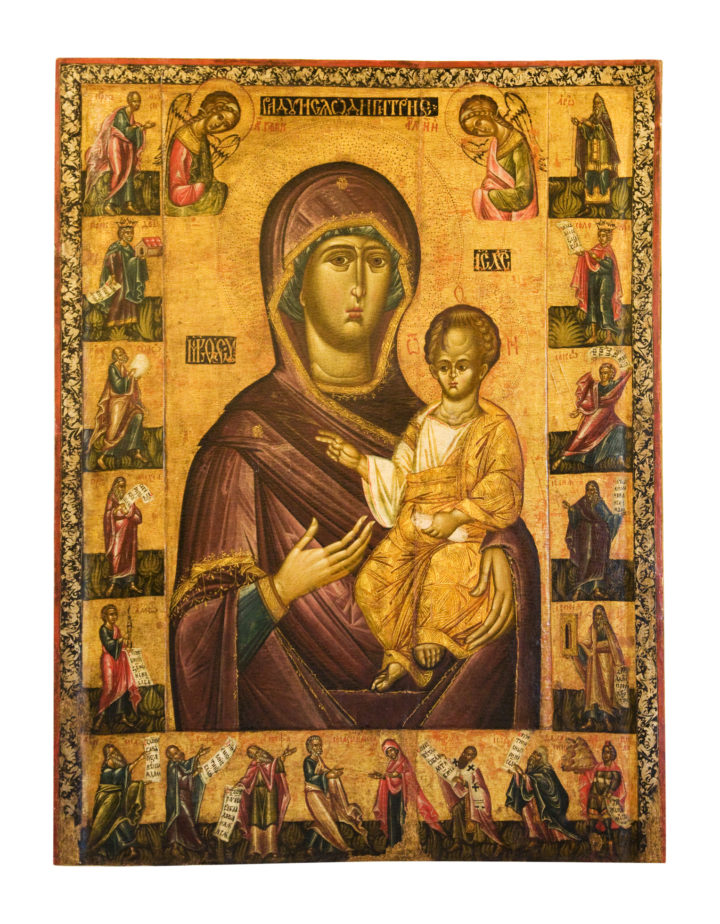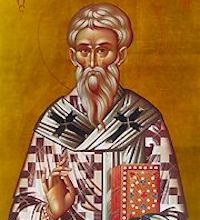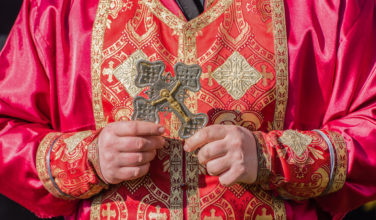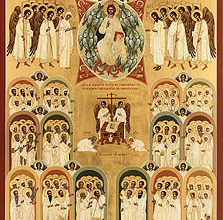Why Do Orthodox Christians Say the Creed?
Comments Off on Why Do Orthodox Christians Say the Creed?
 When the Orthodox Christian Church was fairly new, it was especially vulnerable to misconceptions and heresies. Even though some issues do still exist today, the church was set up to help prevent them from taking root.
When the Orthodox Christian Church was fairly new, it was especially vulnerable to misconceptions and heresies. Even though some issues do still exist today, the church was set up to help prevent them from taking root.
One of the best lines of defense we have against both of these ideas is the Nicene Creed. For Greek Orthodox Christians, the Creed is a concise statement of faith that keeps them focused on what is really important. Here’s more information about it:
How is “Creed” Defined?
According to Webster’s Dictionary, a creed is “a statement of the basics of belief or religion.” It comes from the Latin word credo, which actually means, “I believe.” This is the basic intent behind the creed that we recite every week at church. It’s both a basic summary and a declaration of our Christian beliefs. So, when someone asks what our beliefs are, we can simply recite the Nicene Creed because it has everything we believe concisely summarized within it.
For Orthodox Christians, the creed serves to reaffirm our faith every time we recite it. It gives us a chance to really stop and consider what our beliefs are. It also serves to show others who aren’t Orthodox Christians exactly what we believe.
Nicene Creed Began as a Defense Against Heresies
The Nicene Creed was developed at the Council of Nicea in 325. Their sole purpose was to help Orthodox Christians deal with the various heresies that were common during that time period. The version that we recite today, however, came about through an amendment that was written in Constantinople in 381.Though there are always people who have the wrong idea about what Orthodox Christianity is; it was an especially common occurrence in the early days of the church. The creed was developed to help give Christians a solid voice.
What Was the Heresy of Arianism?
At the time, the biggest threat to Orthodox Christianity was a heresy known as Arianism, which was developed in Alexandria, Egypt by a man named Arius. This heresy confused the relationship between God the Father and God the Son. Arius believed that God the Son (Jesus) was lesser than God the Father, thus declaring that Jesus wasn’t fully God. Christians believe that God the Father, God the Son, and God the Holy Spirit are all one God. It is for this reason that Arianism is a heresy.
What Orthodox Christians Believe
Though the Nicene Creed is fairly short, it is far from basic. Each line of the creed is rich in meaning. However, it is written in a simple enough way for everyone to understand. The creed states that we:
- Believe in one God and that God the Father, God the Son, and God the Holy Spirit are all one God in “three persons”.
- That God the Father created all life and everything on this earth.
- That God the Son (Jesus) came “down from heaven” to redeem us from our sins when he was crucified, and he “rose on third day”.
- We await the second coming of Christ.
- The Sacrament of Holy Baptism will redeem us from our sins.
What is the Nicene Creed?
Here’s a look at the wording of the Nicene Creed. Keep in mind that versions may differ slightly depending on the church. If you have any questions, please ask an Orthodox Christian priest to get the right version for your church.
English Version of the Nicene Creed:
I believe in one God, the Father Almighty, Maker of heaven and earth, and of all things visible and invisible;
And in one Lord Jesus Christ, the Son of God, the Only-begotten, Begotten of the Father before all ages, Light of Light, Very God of Very God, Begotten, not made; of one essence with the Father; by whom all things were made:
Who for us men and for our salvation came down from heaven, and was incarnate of the Holy Spirit and the Virgin Mary, and was made man;
And was crucified also for us under Pontius Pilate, and suffered and was buried;
On the third day He rose again, according to the Scriptures;
He ascended into heaven, and sits at the right hand of the Father;
And He shall come again with glory to judge the living and the dead, Whose kingdom shall have no end.
And I believe in the Holy Spirit, the Lord, and Giver of Life, Who proceeds from the Father, Who with the Father and the Son together is worshipped and glorified, Who spoke by the Prophets;
I believe in one, holy, catholic, and apostolic Church.
I acknowledge one Baptism for the remission of sins.
I look for the Resurrection of the dead,
And the Life of the age to come. Amen.
Greek Version of the Nicene Creed (If you need help with the Greek, please ask a Greek Orthodox Priest or qualified Greek language teacher):
Πιστεύομεν εἰς ἕνα Θεόν, Πατέρα, Παντοκράτορα, ποιητὴν οὐρανοῦ καὶ γῆς, ὁρατῶν τε πάντων καὶ ἀοράτων.
Καὶ εἰς ἕνα Κύριον Ἰησοῦν Χριστόν, τὸν Υἱὸν τοῦ Θεοῦ τὸν μονογενῆ, τὸν ἐκ τοῦ Πατρὸς γεννηθέντα πρὸ πάντων τῶν αἰώνων· φῶς ἐκ φωτός, Θεὸν ἀληθινὸν ἐκ Θεοῦ ἀληθινοῦ, γεννηθέντα οὐ ποιηθέντα, ὁμοούσιον τῷ Πατρί, δι οὗ τὰ πάντα ἐγένετο.
Τὸν δι ἡμᾶς τοὺς ἀνθρώπους καὶ διὰ τὴν ἡμετέραν σωτηρίαν κατελθόντα ἐκ τῶν οὐρανῶν καὶ σαρκωθέντα ἐκ Πνεύματος Ἁγίου καὶ Μαρίας τῆς Παρθένου καὶ ἐνανθρωπήσαντα.
Σταυρωθέντα τε ὑπὲρ ἡμῶν ἐπὶ Ποντίου Πιλάτου, καὶ παθόντα καὶ ταφέντα.
Καὶ ἀναστάντα τῇ τρίτῃ ἡμέρα κατὰ τὰς Γραφάς.
Καὶ ἀνελθόντα εἰς τοὺς οὐρανοὺς καὶ καθεζόμενον ἐκ δεξιῶν τοῦ Πατρός.
Καὶ πάλιν ἐρχόμενον μετὰ δόξης κρῖναι ζῶντας καὶ νεκρούς, οὗ τῆς βασιλείας οὐκ ἔσται τέλος.
Καὶ εἰς τὸ Πνεῦμα τὸ Ἅγιον, τὸ κύριον, τὸ ζωοποιόν, τὸ ἐκ τοῦ Πατρὸς ἐκπορευόμενον, τὸ σὺν Πατρὶ καὶ Υἱῷ συμπροσκυνούμενον καὶ συνδοξαζόμενον, τὸ λαλῆσαν διὰ τῶν προφητῶν.
Εἰς μίαν, Ἁγίαν, Καθολικὴν καὶ Ἀποστολικὴν Ἐκκλησίαν.
Ὁμολογῶ ἓν βάπτισμα εἰς ἄφεσιν ἁμαρτιῶν.
Προσδοκῶ ἀνάστασιν νεκρῶν.
Καὶ ζωὴν τοῦ μέλλοντος αἰῶνος.
Ἀμήν.
Those are just a few of the things that are outlined in the Nicene Creed. For a more detailed explanation of the creed, you may want to ask your priest to explain it to you line-by-line. Actually understanding what you’re saying makes it even more powerful!
Source:
Nicene-Constantinopolitan Creed
The Religion section on GreekBoston.com was written by Greeks to help people understand some of the traditions of the Orthodox Christian religion, which is a religion practiced by people in countries such as Greece, Russia, United States, and other nations throughout the world. This article is not a substitute for information found in the Holy Bible or by our church fathers, priests, and other clergy members.
Categorized in: Greek Orthodox Religious Information
This post was written by Greek Boston





